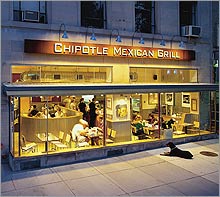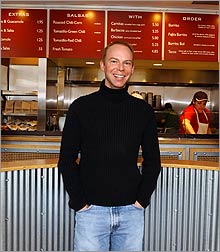|
Can fast food be 'good' food? Chipotle is growing by leaps and bounds, offering what its CEO calls 'food with integrity,' says Fortune's Marc Gunther.
NEW YORK (Fortune) -- People have integrity. Good companies operate with integrity. But can food possess integrity? Absolutely, says Steve Ells, the founder and chief executive of Chipotle Mexican Grill (Charts), the rapidly expanding fast-food chain.
"Food with integrity," Ells says, "is driving our growth and profitably." And what does "food with integrity" mean? At Chipotle, it means seeking out "ingredients that are sustainably grown and naturally raised with respect for the animals, the land and the farmers who produce the food." The company says its goal is "no less ambitious than revolutionizing the way America grows, gathers, serves and eats its food." And you though Chipotle just sold tacos and burritos. Better to think of Chipotle as the fast-food equivalent of yuppie supermarket chain Whole Foods (Charts) Markets. Chipotle serves fresh food, avoids meat with hormones or antibiotics, looks for organic ingredients when possible and practices transparency - which, in the restaurant business, means that you get to watch as the short-order cooks customize your oversized burrito. Whether Chipotle's values drive growth and profitability, as Ells argues, is an interesting question, but there's no doubt that the company's financial performance has been stellar. Since 2002, Chipotle has expanded from 164 to more than 530 units. Revenues have tripled, as well, and they should approach $800 million in 2006. The company sold shares to the public in January, with an IPO priced at $22 - now the stock trades for about $51. McDonald's (Charts), which invested in Chipotle in 1998 and still owns about half of CMG's shares, last week began offering them to its own shareholders at a 10 percent discount. It plans to sell the rest of its stake this fall. The 41-year-old Ells is not a numbers guy. He's an art history major and a classically trained chef, who after earning a degree from the elite Culinary Institute of America worked at a posh San Francisco eatery called Stars. He opened the first Chipotle's in Denver in 1993, hoping to save enough money to open "my real restaurant," he says. His ownership stake in the company is now worth about $48 million. "It turns out that Chipotle is pretty real," he says. From the beginning, Ells wanted to do fast food differently. He kept the menu simple - burritos, tacos, burrito bols (a burrito without the tortilla) and salads. Most food at Chipotle was, and is, made fresh daily; its people chop fresh tomatoes and garlic, pull oregano leaves off the stems and toast cumin seeds. Ells decided to go "beyond fresh" after he ran into a problem with pigs: Chipotle's pork carnitas weren't selling. He tinkered with the recipe, then tried a different kind of pork - hormone free, raised in open pasture or what are called deeply bedded pens from a network of farmers called Niman Ranch. It tasted a lot better, he says. Ells dug deeper into the world of pig farming, and learned the most pigs are raised in confined conditions, on factory farms. "As I toured confinement operations and looked at how the animals were treated and what the workers were subjected to and the effect on the environment, I knew that I didn't want my success to be based on that kind of exploitation," Ells says. (In response, Cindy Cunningham of the National Pork Board says: "Farmers live on the farm. They breathe the air. They drink the water. It's in their best interest to protect the environment, and they do. The same goes for animal care - an animal that is not well cared-for is not going to produce well.") Today, all of Chipotle's pork, about half of its chicken and about a third of its beef is "naturally raised," according to Ells. By this, he means that livestock are raised without hormones or antibiotics and given all vegetarian feed. (Natural, unlike organic, is not a legal term, so it can mean whatever marketers want it to mean.) Chipotle can't go "organic or free-range overnight," Ells says, "because the price of a burrito would be $15." Making the switch to natural pork pushed the price of carnitas up by $1, to about $5.50, but they are selling better now. Meanwhile, the chain is striving to buy organic where practical; about 20 percent of the beans at Chipotle are organic. Do customers care? Not all of them, Ells says, but some do. Either way, he is convinced that fresh, naturally raised food tastes better - which his customers do care about. It's part of a branding package that includes the store design, the humorous ads and the world music that plays inside. "There's more emotional attachment to food when you go into Chipotle than when you go into traditional fast food," Ells says. That may sound like a putdown of Mickey D's, but one of Chipotle's strongest supporters is Mats Lederhausen, who as managing director of McDonald's Ventures straddles the world of traditional fast food and more contemporary outlets like Chipotle and Pret A Manger, a British sandwich chain that is also part-owned by McDonald's. By e-mail, Lederhausen, a Chipotle director, told me that that he thinks the company's values are vital to its success. Chipotle, he says, is "one of the best examples in the marketplace of a business with deeper values, deeper meaning and ultimately deeper connections with their customer base, WITHOUT being pretentious, boring or finger pointing." "Any business that can define a purpose bigger than their product," he says, "will outperform businesses that are just selling product." It's tough to argue with that. __________________________ |
|


